- Home
- Stanley G. Weinbaum
The Point of View
The Point of View Read online
The Point of View
Stanley G. Weinbaum
The Point of View
by Stanley Grauman Weinbaum
"I am too modest!" snapped the great Haskel van Manderpootz, pacing irritably about the limited area of his private laboratory, glaring at me the while. "That is the trouble. I undervalue my own achievements, and thereby permit petty imitators like Corveille to influence the committee and win the Morell prize."
"But," I said soothingly, "you've won the Morell physics award half a dozen times, professor. They can't very well give it to you every year."
"Why not, since it is plain that I deserve it?" bristled the professor. "Understand, Dixon, that I do not regret my modesty, even though it permits conceited fools like Corveille, who have infinitely less reason than I for conceit, to win awards that mean nothing save prizes for successful bragging. Bah! To grant an award for research along such obvious lines that I neglected to mention them, thinking that even a Morell judge would appreciate their obviousness! Research on the psychon, eh! Who discovered the psychon? Who but van Manderpootz?"
"Wasn't that what you got last year's award for?" I asked consolingly. "And after all, isn't this modesty, this lack of jealousy on your part, a symbol of greatness of character?"
"True — true!" said the great van Manderpootz, mollified. "Had such an affront been committed against a lesser man than myself, he would doubtless have entered a bitter complaint against the judges. But not I. Anyway, I know from experience that it wouldn't do any good. And besides, despite his greatness, van Manderpootz is as modest and shrinking as a violet." At this point he paused, and his broad red face tried to look violet-like.
I suppressed a smile. I knew the eccentric genius of old, from the days when I had been Dixon Wells, undergraduate student of engineering, and had taken a course in Newer Physics (that is, in Relativity) under the famous professor. For some unguessable reason, he had taken a fancy to me, and as a result, I had been involved in several of his experiments since graduation. There was the affair of the subjunctivisor, for instance, and also that of the idealizator; in the first of these episodes I had suffered the indignity of falling in love with a girl two weeks after she was apparently dead, and in the second, the equal or greater indignity of falling in love with a girl who didn't exist, never had existed, and never would exist — in other words, with an ideal. Perhaps I'm a little susceptible to feminine charms, or rather, perhaps I used to be, for since the disaster of the idealizator, I have grimly relegated such follies to the past, much to the disgust of various 'vision entertainers, singers, dancers, and the like.
So of late I had been spending my days very seriously, trying wholeheartedly to get to the office on time just once, so that I could refer to it next time my father accused me of never getting anywhere on time. I hadn't succeeded yet, but fortunately the N. J. Wells Corporation was wealthy enough to survive even without the full-time services of Dixon Wells, or should I say even with them? Anyway, I'm sure my father preferred to have me late in the morning after an evening with van Manderpootz than after one with Tips Alva or Whimsy White, or one of the numerous others of the ladies of the 'vision screen. Even in the twenty-first century, he retained a lot of old-fashioned ideas.
Van Manderpootz had ceased to remember that he was as modest and shrinking as a violet. "It has just occurred to me," he announced impressively, "that years have character much as humans have. This year, 2015, will be remembered in history as a very stupid year, in which the Morell prize was given to a nincompoop. Last year, on the other hand, was a very intelligent year, a jewel in the crown of civilization. Not only was the Morell prize given to van Manderpootz, but I announced my discrete field theory in that year, and the University unveiled Gogli's statue of me as well." He sighed. "Yes, a very intelligent year! What do you think?"
"It depends on how you look at it," I responded glumly. "I didn't enjoy it so much, what with Joanna Caldwell and Denise d'Agrion, and your infernal experiments. It's all in the point of view."
The professor snorted. "Infernal experiments, eh! Point of view! Of course it's all in the point of view. Even Einstein's simple little synthesis was enough to prove that. If the whole world could adopt an intelligent and admirable point of view — that of van Manderpootz, for instance — all troubles would be over. If it were possible — " He paused, and an expression of amazed wonder spread over his ruddy face.
"What's the matter?" I asked.
"Matter? I am astonished! The astounding depths of genius awe me. I am overwhelmed with admiration at the incalculable mysteries of a great mind."
"I don't get the drift."
"Dixon," he said impressively, "you have been privileged to look upon an example of the workings of a genius. More than that, you have planted the seed from which perhaps shall grow the towering tree of thought. Incredible as it seems, you, Dixon Wells, have given van Manderpootz an idea! It is thus that genius seizes upon the small, the unimportant, the negligible, and turns it to its own grand purposes. I stand awe-struck!"
"But what — ?"
"Wait," said van Manderpootz, still in rapt admiration of the majesty of his own mind. "When the tree bears fruit, you shall see it. Until then, be satisfied that you have played a part in its planting."
* * * * *
It was perhaps a month before I saw van Manderpootz again, but one bright spring evening his broad, rubicund face looked out of the phone-screen at me.
"It's ready," he announced impressively.
"What is?"
The professor looked pained at the thought that I could have forgotten. "The tree has borne fruit," he explained. "If you wish to drop over to my quarters, we'll proceed to the laboratory and try it out. I do not set a time, so that it will be utterly impossible for you to be late."
I ignored that last dig, but had a time been set, I would doubtless have been even later than usual, for it was with some misgivings that I induced myself to go at all. I still remembered the unpleasantness of my last two experiences with the inventions of van Manderpootz. However, at last we were seated in the small laboratory, while out in the larger one the professor's technical assistant, Carter, puttered over some device, and in the far corner his secretary, the plain and unattractive Miss Fitch, transcribed lecture notes, for van Manderpootz abhorred the thought that his golden utterances might be lost to posterity. On the table between the professor and myself lay a curious device, something that looked like a cross between a pair of nose-glasses and a miner's lamp.
"There it is," said van Manderpootz proudly. "There lies my attitudinizor, which may well become an epoch-making device."
"How? What does it do?"
"I will explain. The germ of the idea traces back to that remark of yours about everything depending on the point of view. A very obvious statement, of course, but genius seizes on the obvious and draws from it the obscure. Thus the thoughts of even the simplest mind can suggest to the man of genius his sublime conceptions, as is evident from the fact that I got this idea from you."
"What idea?"
"Be patient. There is much you must understand first. You must realize just how true is the statement that everything depends on the point of view. Einstein proved that motion, space, and time depend on the particular point of view of the observer, or as he expressed it, on the scale of reference used. I go farther than that, infinitely farther. I propound the theory that the observer is the point of view. I go even beyond that, I maintain that the world itself is merely the point of view!"
"Huh?"
"Look here," proceeded van Manderpootz. "It is obvious that the world I see is entirely different from the one in which you live. It is equally obvious that a strictly religious man occupies a different world tha
n that of a materialist. The fortunate man lives in a happy world; the unfortunate man sees a world of misery. One man is happy with little, another is miserable with much. Each sees the world from his own point of view, which is the same as saying that each lives in his own world. Therefore there are as many worlds as there are points of view."
"But," I objected, "that theory is to disregard reality. Out of all the different points of view, there must be one that is right, and all the rest are wrong."
"One would think so," agreed the professor. "One would think that between the point of view of you, for instance, as contrasted with that of, say van Manderpootz, there would be small doubt as to which was correct. However, early in the twentieth century, Heisenberg enunciated his Principle of Uncertainty, which proved beyond argument that a completely accurate scientific picture of the world is quite impossible, that the law of cause and effect is merely a phase of the law of chance, that no infallible predictions can ever be made, and that what science used to call natural laws are really only descriptions of the way in which the human mind perceives nature. In other words, the character of the world depends entirely on the mind observing it, or, to return to my earlier statement, the point of view."
"But no one can ever really understand another person's point of view," I said. "It isn't fair to undermine the whole basis of science because you can't be sure that the color we both call red wouldn't look green to you if you could see it through my eyes."
"Ah!" said van Manderpootz triumphantly. "So we come now to my attitudinizor. Suppose that it were possible for me to see through your eyes, or you through mine. Do you see what a boon such an ability would be to humanity? Not only from the standpoint of science, but also because it would obviate all troubles due to misunderstandings. And even more." Shaking his finger, the professor recited oracularly, "'Oh, wad some pow'r the giftie gie us to see oursel's as ithers see us.' Van Manderpootz is that power, Dixon. Through my attitudinizor, one may at last adopt the viewpoint of another. The poet's plaint of more than two centuries ago is answered at last."
"How the devil do you see through somebody else's eyes?"
"Very simply. You will recall the idealizator. Now it is obvious that when I peered over your shoulder and perceived in the mirror your conception of the ideal woman, I was, to a certain extent, adopting your point of view. In that case the psychons given off by your mind were converted into quanta of visible light, which could be seen. In the case of my attitudinizor, the process is exactly reversed. One flashes the beam of this light on the subject whose point of view is desired; the visible light is reflected back with a certain accompaniment of psychons, which are here intensified to a degree which will permit them to be, so to speak, appreciated?"
"Psychons?"
"Have you already forgotten my discovery of the unit particle of thought? Must I explain again how the cosmons, chronons, spations, psychons, and all other particles are interchangeable? And that," he continued abstractedly, "leads to certain interesting speculations. Suppose I were to convert, say, a ton of material protons and electrons into spations — that is, convert matter into space. I calculate that a ton of matter will produce approximately a cubic mile of space. Now the question is, where would we put it, since all the space we have is already occupied by space? Or if I manufactured an hour or two of time? It is obvious that we have no time to fit in an extra couple of hours, since all our time is already accounted for. Doubtless it will take a certain amount of thought for even van Manderpootz to solve these problems, but at the moment I am curious to watch the workings of the attitudinizor. Suppose you put it on, Dixon."
"I? Haven't you tried it out yet?"
"Of course not. In the first place, what has van Manderpootz to gain by studying the viewpoints of other people? The object of the device is to permit people to study nobler viewpoints than their own. And in the second place, I have asked myself whether it is fair to the world for van Manderpootz to be the first to try out a new and possibly untrustworthy device, and I reply, 'No!'"
"But I should try it out, eh? Well, everytime I try out any of your inventions I find myself in some kind of trouble. I'd be a fool to go around looking for more difficulty, wouldn't I?"
"I assure you that my viewpoint will be much less apt to get you into trouble than your own," said van Manderpootz with dignity. "There will be no question of your becoming involved in some impossible love affair as long as you stick to that."
Nevertheless, despite the assurance of the great scientist, I was more than a little reluctant to don the device. Yet I was curious, as well; it seemed a fascinating prospect to be able to look at the world through other eyes, as fascinating as visiting a new world — which it was, according to the professor. So after a few moments of hesitation, I picked up the instrument, slipped it over my head so that the eyeglasses were in the proper position, and looked inquiringly at van Manderpootz.
"You must turn it on," he said, reaching over and clicking a switch on the frame. "Now flash the light to my face. That's the way; just center the circle of light on my face. And now what do you see?"
I didn't answer; what I saw was, for the moment, quite indescribable. I was completely dazed and bewildered, and it was only when some involuntary movement of my head at last flashed the light from the professor's face to the table top that a measure of sanity returned, which proves at least that tables do not possess any point of view.
"O-o-o-h!" I gasped.
Van Manderpootz beamed. "Of course you are overwhelmed. One could hardly expect to adopt the view of van Manderpootz without some difficulties of adjustment. A second time will be easier."
I reached up and switched off the light. "A second time will not only be easier, but also impossible," I said crossly. "I'm not going to experience another dizzy spell like that for anybody."
"But of course you will, Dixon. I am certain that the dizziness will be negligible on the second trial. Naturally the unexpected heights affected you, much as if you were to come without warning to the brink of a colossal precipice. But this time you will be prepared, and the effect will be much less."
Well, it was. After a few moments I was able to give my full attention to the phenomena of the attitudinizor, and queer phenomena they were, too. I scarcely know how to describe the sensation of looking at the world through the filter of another's mind. It is almost an indescribable experience, but so, in the ultimate analysis, is any other experience.
What I saw first was a kaleidoscopic array of colors and shapes, but the amazing, astounding, inconceivable thing about the scene was that there was no single color I could recognize! The eyes of van Manderpootz, or perhaps his brain, interpreted color in a fashion utterly alien to the way in which my own functioned, and the resultant spectrum was so bizarre that there is simply no way of describing any single tint in words. To say, as I did to the professor, that his conception of red looked to me like a shade between purple and green conveys absolutely no meaning, and the only way a third person could appreciate the meaning would be to examine my point of view through an attitudinizor while I was examining that of van Manderpootz. Thus he could apprehend my conception of van Manderpootz's reaction to the color red.
And shapes! It took me several minutes to identify the weird, angular, twisted, distorted appearance in the center of the room as the plain laboratory table. The room itself, aside from its queer form, looked smaller, perhaps because van Manderpootz is somewhat larger than I.
But by far the strangest part of his point of view had nothing to do with the outlook upon the physical world, but with the more fundamental elements — with his attitudes. Most of his thoughts, on that first occasion, were beyond me, because I had not yet learned to interpret the personal symbolism in which he thought. But I did understand his attitudes. There was Carter, for instance, toiling away out in the large laboratory; I saw at once what a plodding, unintelligent drudge he seemed to van Manderpootz. And there was Miss Fitch; I confess that she had always seemed unattra
ctive to me, but my impression of her was Venus herself beside that of the professor! She hardly seemed human to him and I am sure that he never thought of her as a woman, but merely as a piece of convenient but unimportant laboratory equipment.
At this point I caught a glimpse of myself through the eyes of van Manderpootz. Ouch! Perhaps I'm not a genius, but I'm dead certain that I'm not the grinning ape I appeared to be in his eyes. And perhaps I'm not exactly the handsomest man in the world either, but if I thought I looked like that — ! And then, to cap the climax, I apprehended van Manderpootz's conception of himself!
"That's enough!" I yelled. "I won't stay around here just to be insulted. I'm through!"
I tore the attitudinizor from my head and tossed it to the table, feeling suddenly a little foolish at the sight of the grin on the face of the professor.
"That is hardly the spirit which has led science to its great achievements, Dixon," he observed amiably. "Suppose you describe the nature of the insults, and if possible, something about the workings of the attitudinizor as well. After all, that is what you were supposed to be observing."
I flushed, grumbled a little, and complied. Van Manderpootz listened with great interest to my description of the difference in our physical worlds, especially the variations in our perceptions of form and color.
"What a field for an artist!" he ejaculated at last. "Unfortunately, it is a field that must remain forever untapped, because even though an artist examined a thousand viewpoints and learned innumerable new colors, his pigments would continue to impress his audience with the same old colors each of them had always known." He sighed thoughtfully, and then proceeded. "However, the device is apparently quite safe to use. I shall therefore try it briefly, bringing to the investigation a calm, scientific mind which refuses to be troubled by the trifles that seem to bother you."
He donned the attitudinizor, and I must confess that he stood the shock of the first trial somewhat better than I did. After a surprised "Oof!" he settled down to a complacent analysis of my point of view, while I sat somewhat self-consciously under his calm appraisal. Calm, that is, for about three minutes.

 The Complete Margaret of Urbs
The Complete Margaret of Urbs The Black Flame
The Black Flame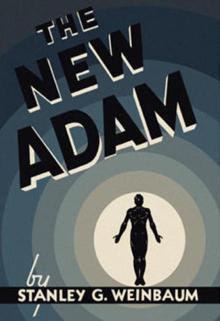 The New Adam
The New Adam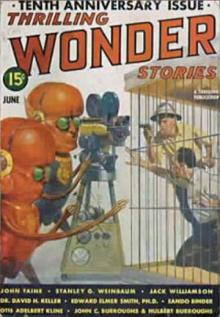 Dawn of Flame
Dawn of Flame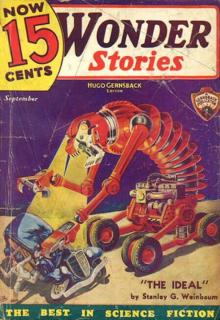 The Ideal
The Ideal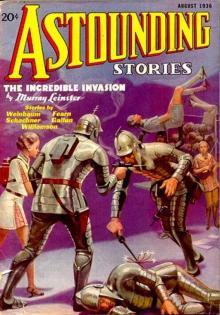 Proteus Island
Proteus Island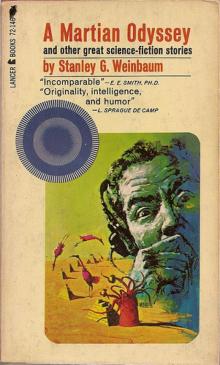 The Worlds of If
The Worlds of If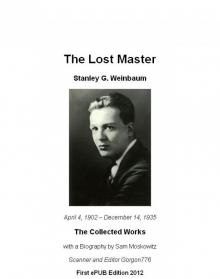 The Lost Master - The Collected Works
The Lost Master - The Collected Works The 27th Golden Age of Science Fiction
The 27th Golden Age of Science Fiction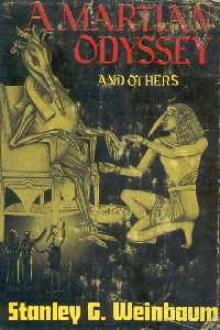 A Martian Odyssey
A Martian Odyssey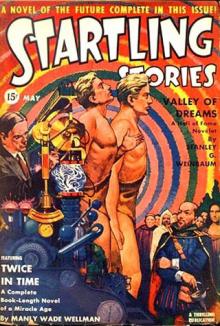 Valley of Dreams
Valley of Dreams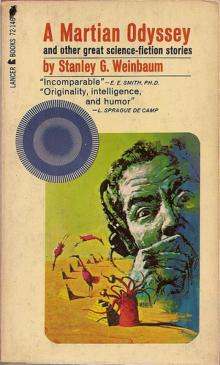 The Point of View
The Point of View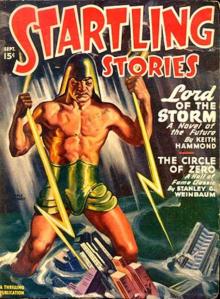 The Circle of Zero
The Circle of Zero